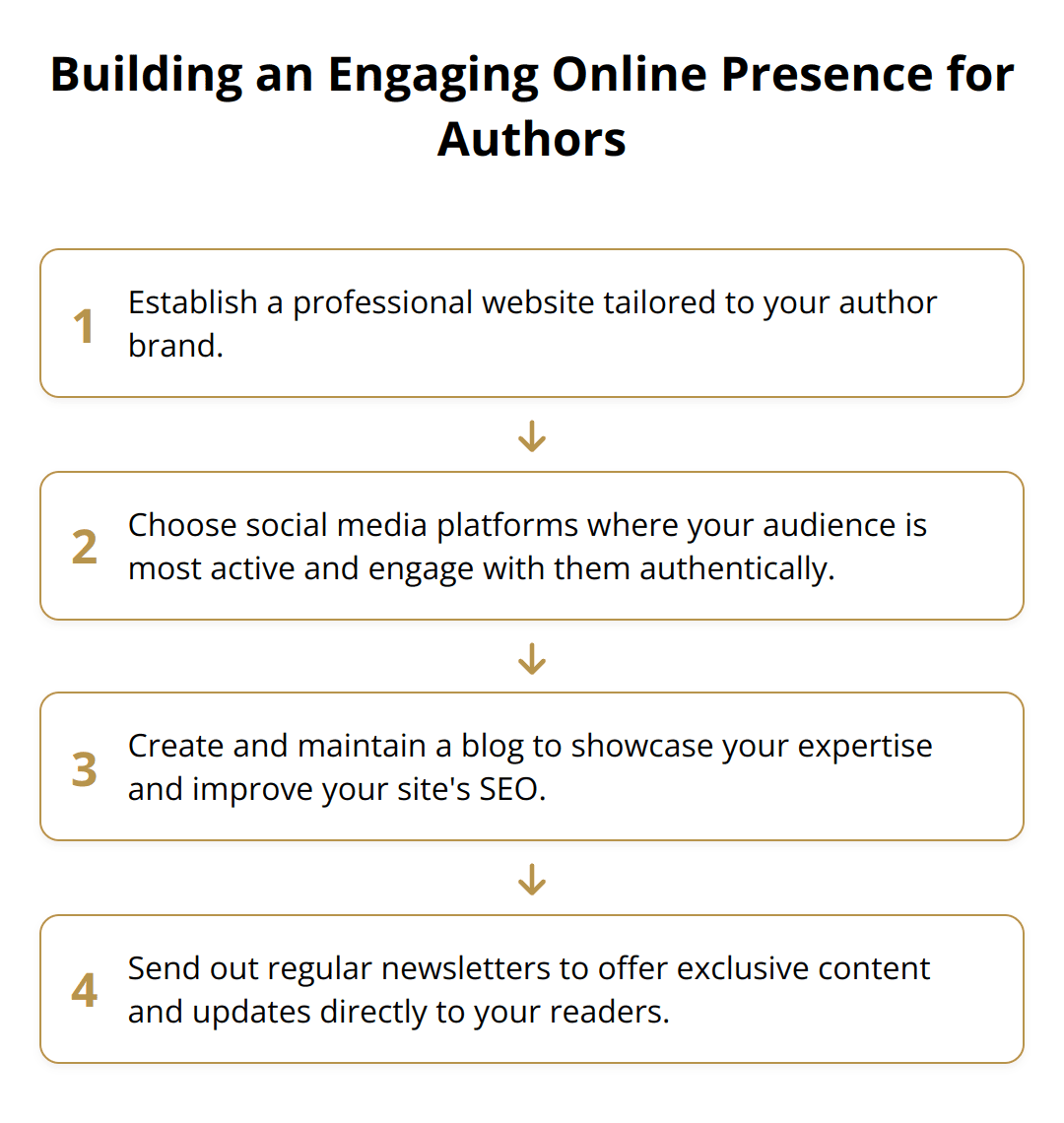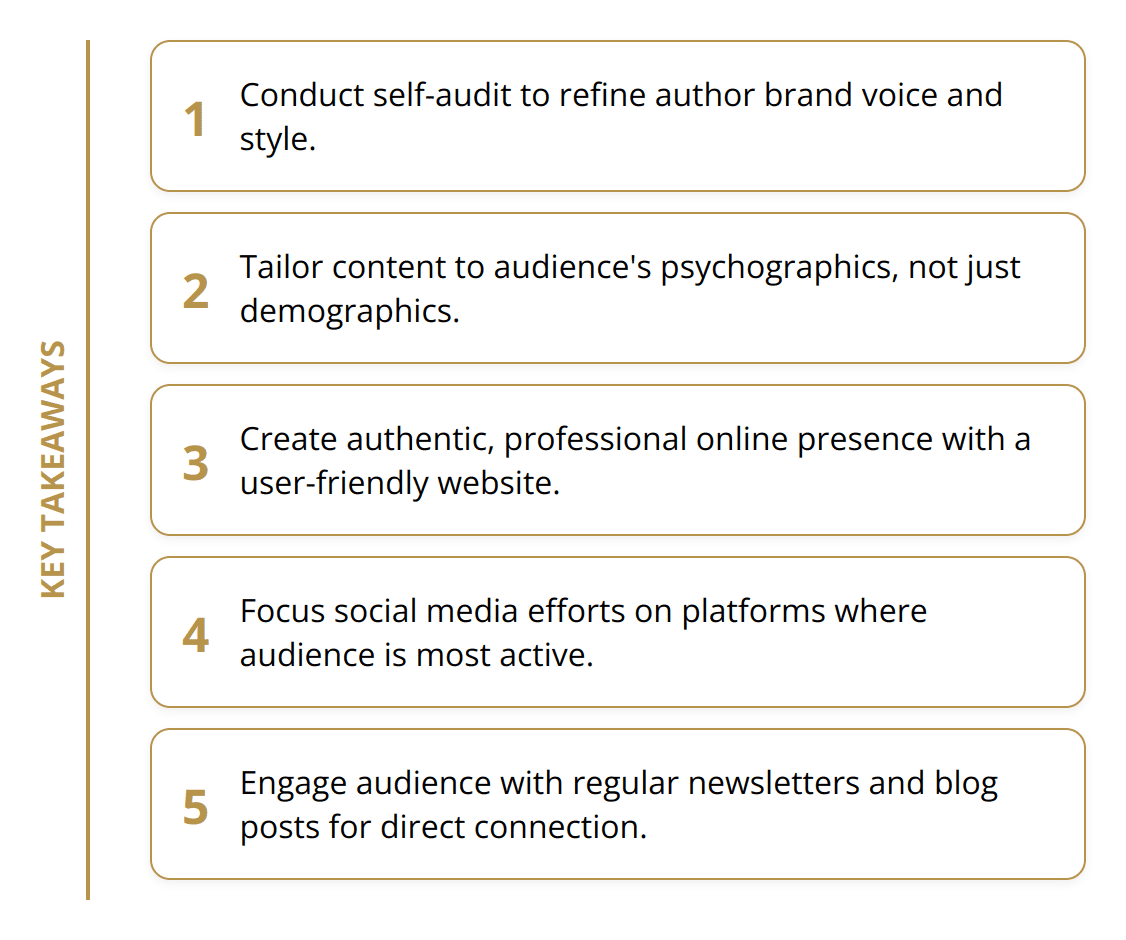Building a distinctive author brand is pivotal for writers aiming to stand out in a crowded market. At Beverly Hills Publishing, we understand the power of a well-crafted brand in connecting authors with their readers.
In this guide, we share practical tips to define, build, and promote your author brand, ensuring you make a lasting impression.
Defining Your Author Brand
The backbone of any successful writer is their author brand—the unique blend of voice, style, and persona that sets them apart. As you venture into the world of writing, knowing how to establish this aspect of your career is non-negotiable.
First, pinpointing your unique voice and style is not just about choosing genres or topics; it’s about identifying the specific way you approach your narratives. Are you humorous, serious, or transformative? Do your writings inspire or educate? The answers will set the foundation. It’s vital to remain consistent with this voice across all platforms, from your books to your blog posts and even social media updates.
Next, understanding your target audience is critical. This isn’t about making broad assumptions based on demographics alone but rather delving into the psychographics of your potential readers. What are their interests, challenges, and desires? How do they consume content? Understanding these facets will enable you to tailor your author brand to resonate deeply with your audience. Tools like Google Analytics and audience segmentation platforms can provide invaluable insights here.
Crafting your author persona and story involves blending your personal journey with your professional aspirations. This persona should be relatable and authentic, giving your audience a real person to connect with. Share your triumphs and struggles, let them see the person behind the pen. This narrative should be consistent across your author bio, interviews, and personal appearances.

Here are a few actionable steps to consider in defining your author brand:
- Conduct a self-audit: Reflect on your values, interests, and the unique perspectives you bring to your writing.
- Research: Look into authors you admire or who share a similar target audience. Identify what distinguishes them and consider how you can differentiate yourself.
- Engage with your audience: Utilize social media or blogging to test what resonates with your readers. Pay attention to feedback and adjust accordingly.
- Professional presentation: Invest in high-quality photos and design for your website and promotional materials to convey professionalism and attention to detail.
By taking these steps to define your author brand effectively, you’re not just creating a persona, you’re establishing a promise to your readers—setting the stage for a lasting and impactful relationship.
Building an Online Presence
In the digital age, an author’s online presence is their gateway to the world. It’s an extension of their brand, connecting them to a global audience and opportunities beyond conventional boundaries. Effective use of online platforms transcends traditional marketing, creating avenues for engagement, visibility, and community building.
Creating a Professional Website
A professional website serves as the cornerstone of your digital footprint. It’s not merely a place to list your books; it’s a hub for your brand. Every author should consider it non-negotiable to have a website with a clean, user-friendly design that reflects their author brand’s essence. A website should include a compelling author bio, a catalog of your work, contact information, and links to social media. Platforms like WordPress and Squarespace make this more accessible than ever, offering templates tailored to writers and authors. Incorporating SEO practices to enhance visibility can significantly affect your site’s discoverability. Think of keywords your audience might use to find your books or topics and weave them into your site’s content.

Leveraging Social Media Effectively
Social media is an invaluable tool for building and engaging with your audience. However, spreading yourself too thin across all platforms can dilute your efforts. Focus on platforms where your target audience is most active. If your books cater to professionals, LinkedIn might be your go-to. For a younger demographic, Instagram and TikTok provide visual platforms to showcase your brand creatively.
It’s not just about frequency; it’s about value. Share content that enriches your audience’s lives, whether through writing advice, insights into your writing process, or snippets from your daily life that align with your author brand. Paid promotions can also be a strategic move to boost visibility in a crowded space. However, authenticity should never be compromised for reach. Your followers are interested in you and your journey.
Engaging Through Newsletters and Blogs
Newsletters and blogs are direct channels to deepen relationships with your readers beyond the constraints of social media algorithms. They allow for a more personalized approach to sharing content, updates, and exclusive previews. Maintaining a blog on your website not only showcases your expertise and personality but also improves your site’s SEO. Newsletters, on the other hand, invite readers into a more intimate space, your inbox. Platforms like Mailchimp offer easy-to-use templates and robust analytics to track engagement. However, the golden rule with both blogs and newsletters is consistency. Whether it’s a bi-weekly blog post or a monthly newsletter, keep your audience engaged with regular updates.

In summary, an online presence is not optional for authors—it’s essential. It encompasses more than just posting on social media; it’s about creating a cohesive and engaging brand experience across all digital touchpoints. Here are a few actionable tips:
- Website Must-Haves: Author bio, work showcase, contact form.
- Social Media Focus: Choose 2-3 platforms where your audience is most active.
- Content Value: Provide enriching, brand-aligned content across all platforms.
- Newsletter Engagement: Offer exclusive content to foster community.
Effective online presence combines strategic planning with authenticity, creating a brand that resonates and engages.
How to Promote Your Author Brand
Effective promotion of your author brand is not just about visibility; it’s about creating meaningful engagements that turn readers into loyal fans. A strategic approach to brand promotion can significantly impact your reach and reputation in the literary world.
Maintain a Unified Visual Identity
Your visual identity, including your logo, color scheme, and typography, should be consistent across all platforms. This cohesiveness makes your brand easily recognizable and professional. Tools like Canva and Adobe Spark offer easy-to-use features to help maintain consistency. Remember, your book covers, social media banners, and website should all reflect your brand’s visual theme.
Forge Strategic Connections
Networking is invaluable. Connect with other authors, industry professionals, and influencers in your genre. Social media, especially LinkedIn and Twitter, are fantastic platforms for starting these conversations. Don’t just reach out; engage with their content genuinely. This can lead to collaborative opportunities, such as joint webinars, guest blogging, or even cross-promotions that benefit both parties.
Participate Actively in Events
Attending or participating in literary events, book fairs, and writers’ conferences can significantly boost your brand. These events offer exposure to new audiences and the chance to solidify your brand identity. Speaking engagements or book signings position you as an authority in your field. Always be prepared with business cards or flyers that direct new contacts to your online platforms.

The key to successful brand promotion lies in a strategic, consistent approach across all these channels. By maintaining a cohesive visual identity, actively networking, and participating in relevant events, you set the stage for a stronger, more engaging author brand.
- Recommendation: Use social media scheduling tools like Buffer or Hootsuite to keep your online presence active and consistent.
- Statistic: Authors who engage directly with their audience on social media see an increase in loyalty and readership over time.
Final Thoughts
Building a distinctive author brand is essential in today’s competitive market. We’ve explored practical tips to define, build, and promote your author brand. From establishing a unique voice to leveraging digital platforms and engaging with your audience, each strategy plays a vital role in creating a memorable brand that resonates with readers.

Authenticity and persistence are the heartbeats of successful brand building. An authentic brand reflects your true personality and values, making your work relatable and engaging to your audience. Persistently applying the strategies we discussed, even when progress seems slow, is key to long-term success. Remember, brand building is a marathon, not a sprint.
Continuous learning and adaptation are equally critical. The publishing industry and digital marketing landscapes are ever-evolving, so staying informed about the latest trends and adjusting your strategies accordingly will keep your brand relevant and dynamic. Consider Beverly Hills Publishing as your partner in this journey. Our expertise in combining publishing with strategic branding and marketing can elevate your visibility, establish you as an authority in your field, and enhance your overall brand.
In conclusion, an author’s brand is much more than a logo or a book cover—it’s a comprehensive representation of your identity as a writer. It influences how readers perceive you and determines your ability to connect with your intended audience on a meaningful level. By focusing on authenticity, persistence, and the willingness to learn and adapt, you’re setting a solid foundation for lasting success in the literary world. Start today, and remember, you’re not alone on this journey.















































































































































































































































